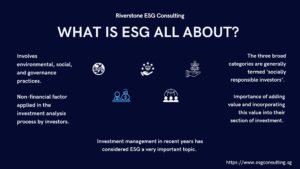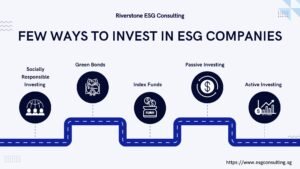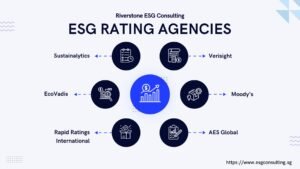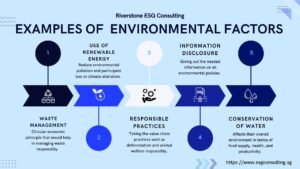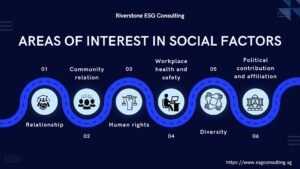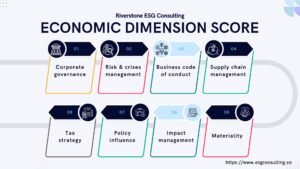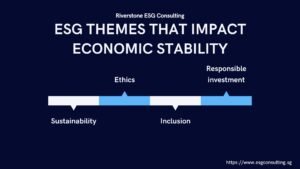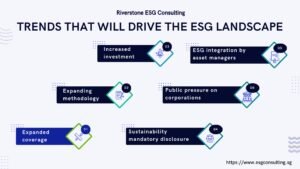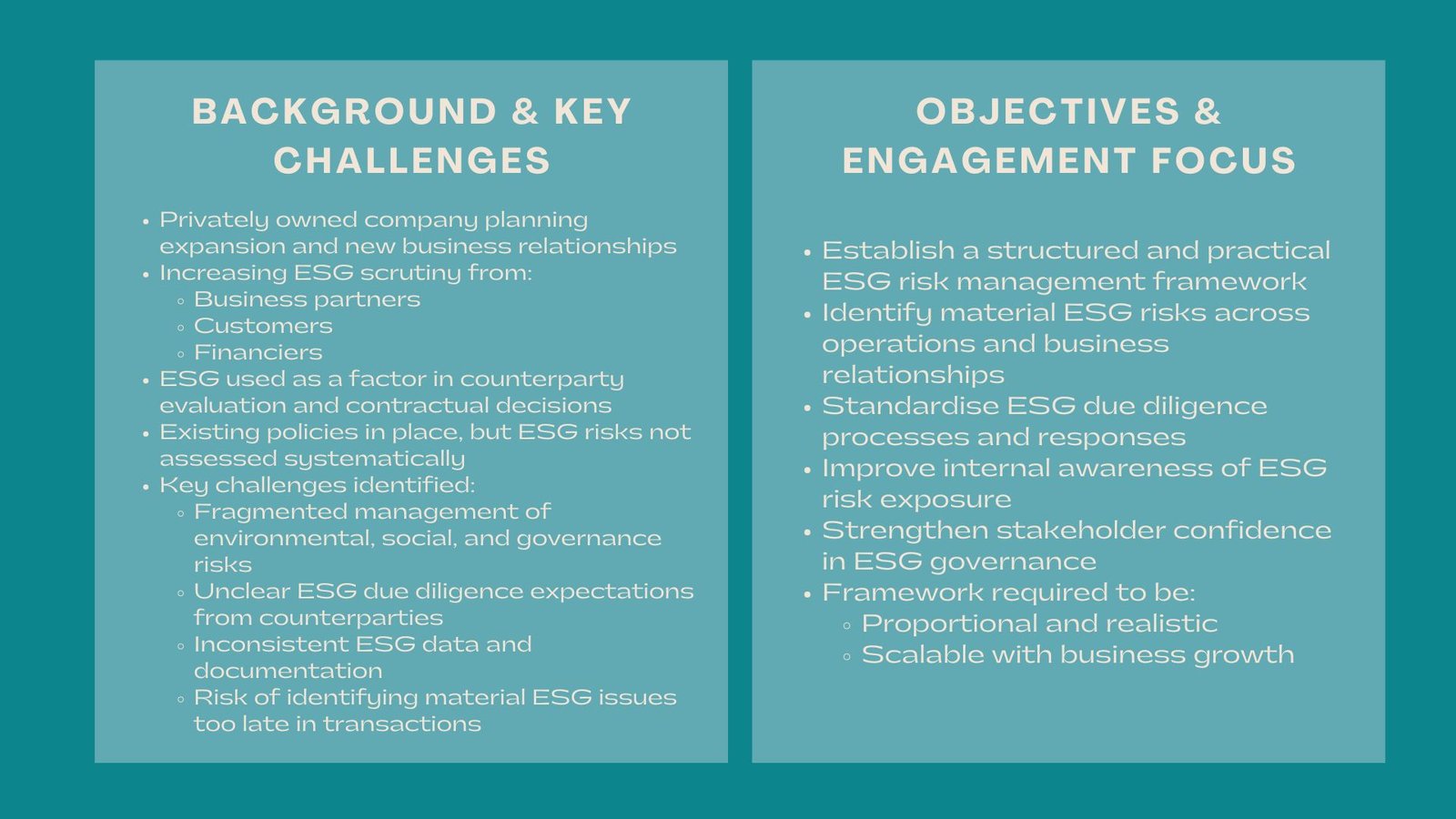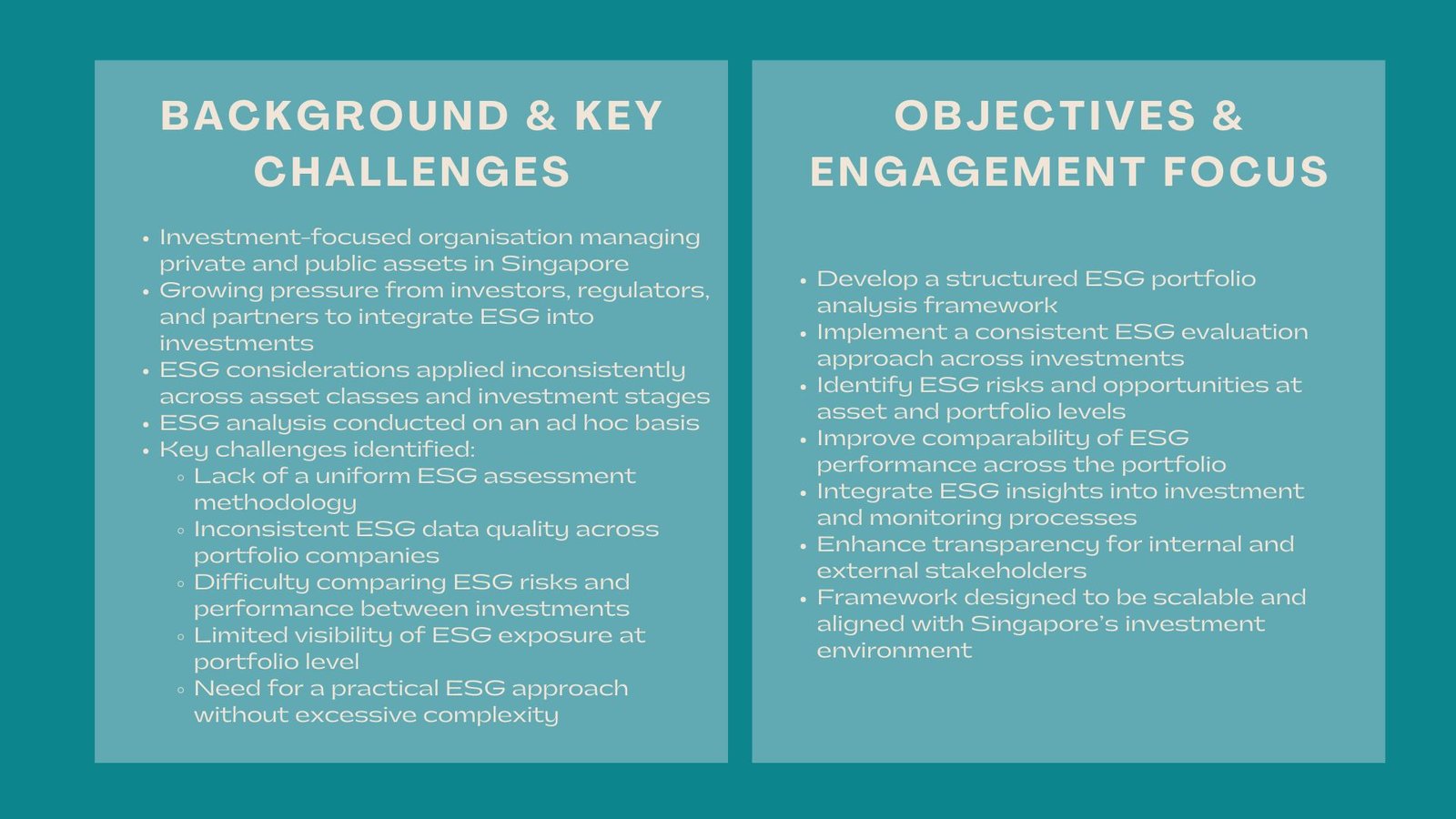Singapore ESG Reporting Framework: Key Requirements for Listed Companies
Introduction to Singapore ESG Reporting Requirements
Over the past few years, sustainability has been transformed as a voluntary effort into a regulatory measure of the listed companies of Singapore. The Singapore Exchange (SGX has led the transformation process by making mandatory reporting on sustainability in order to make sure businesses operate in accordance with the global environmental, social and governance (ESG) practices.
Listed companies will be required to report on how they address the risks and opportunities of ESGs as the investors, regulators, and consumers seek more transparency. Such disclosures are no longer compliance-only disclosures, they are the primary indicator of a company health, sound ethical practices, and the ability to create long-term value.
This paper discusses the Singapore ESG Reporting Framework, its main requirements, ESG metrics and governance expectations that all the listed entities in the SGX are expected to fulfill.
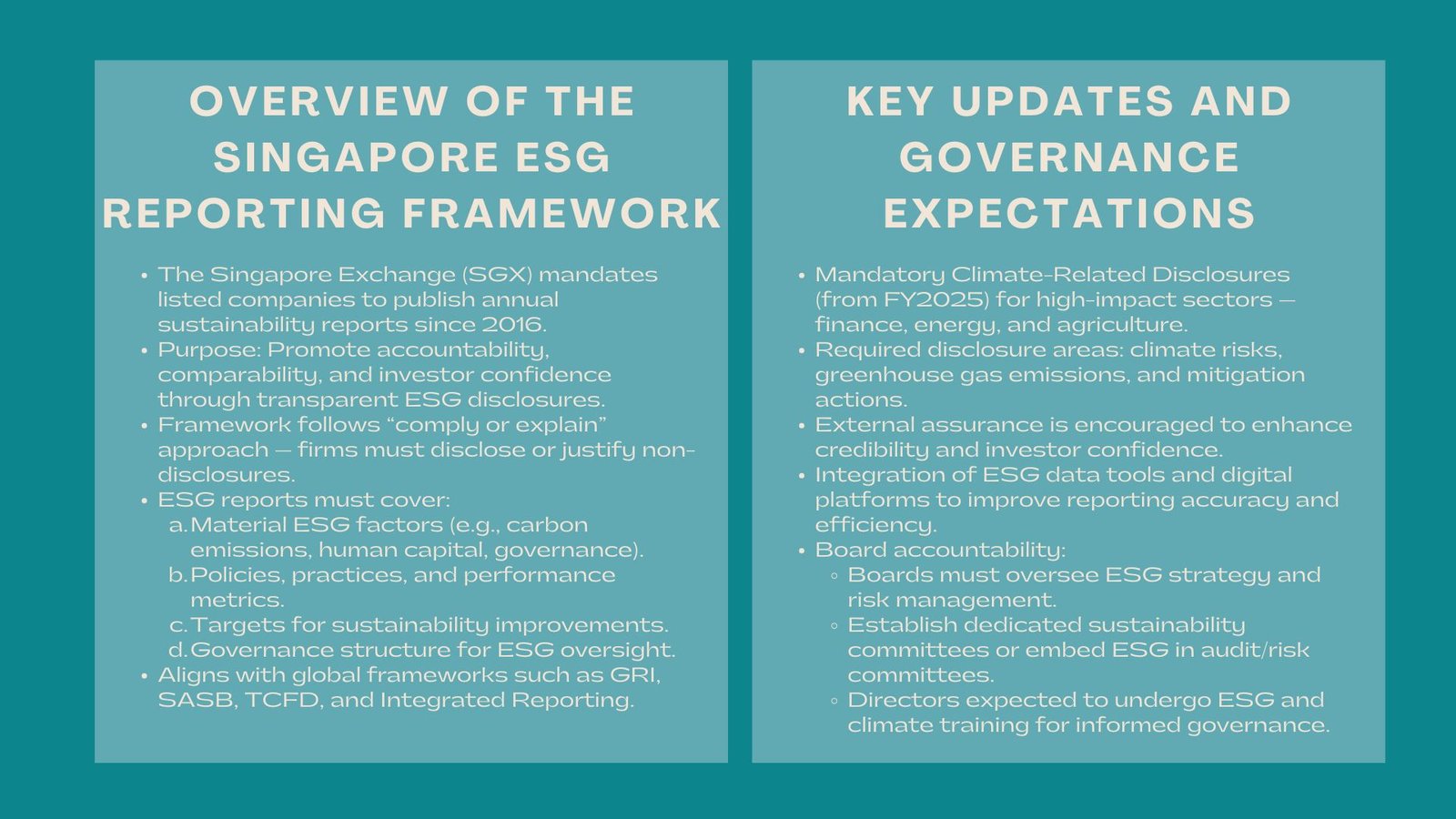
Knowledge of Singapore ESG Reporting Framework.
The Rationale of the Framework.
The SGX Sustainability Reporting Framework had been created to encourage consistency, duty, and comparability among the listed companies. It will assist the investors make informed decisions on how the firms handle material ESG factors.
The SGX promotes sustainable growth as the mandatory ESG reporting would persuade companies not to pursue profit maximization on a short-term basis. This does not only increase investor confidence, but also makes Singapore one of the major advisors of responsible finance and sustainable investment.
Scope of Application
All issuers listed on the SGX have had to produce a sustainability report on an annual basis since 2016. Such reports should be provided under four months after the end of the financial year and may either be incorporated in the annual report or they may be provided independently.
Companies should work according to the approach comply or explain- in case some disclosures are not provided, companies must explain the reasons as to why.
Core Components of ESG Reporting Under SGX
To comply with the ESG reporting framework compliance requirements for listed companies in Singapore, businesses must disclose information in five key areas:
Material ESG Factors
Companies need to find out which environmental, social, and governance issues are the most significant to business and stakeholders. These may be focused on climate change, human capital management, data privacy, or supply chain ethics.
Material factors should also be chosen depending on financial relevance and the expectations of the stakeholders. An example is that a manufacturing company may focus on the carbon emission, whereas a financial institution may focus on governance and risk management.
Policies, Practices and Performance.
Businesses should also map out policies and management systems that will be used to respond to every material ESG factor. They must also contain performance measures to show improvement – energy consumption, waste minimization, diversity of the work force, or an independent board.
This will enable investors to evaluate not just the promises of a firm but also how it can turn them into quantifiable outcomes.
Targets
Sustainability strategies are brought to life by targets. SGX obliges businesses to publish the quantitative or qualitative targets that they have established regarding their performance on the ESG. Such targets assist the stakeholders in keeping track of the progress overtime and checking whether companies are improving on a steady basis.
Sustainability Governance
ESG responsibility commences with the top. The listed companies are required to explain how they will govern themselves to be sustainable, the roles of the board and the management in managing the ESG risks and opportunities.
Having a clear governance will show that sustainability is part of the main decision-making processes and is not an independent initiative.
Standards and Frameworks of Sustainability Reporting.
Although SGX does not dictate a single international framework, companies are recommended to follow the already accepted standards which include:
- Global Reporting Initiative (GRI).
- Sustainability Accounting Standards Board (SASB).
- Task Force on Climate-related Financial Disclosures (TCFD).
- Integrated Reporting Framework (IR).
Conformance to these standards makes it comparable and globally credible.
New Recent Updates and Developments.
Compulsory Climate-Related Disclosure.
In 2022, SGX implemented a major change in the sustainability reporting regime, through mandatory climate-related disclosures. This puts Singapore in line with the global practice in the TCFD framework.
Beginning with FY2025, high-impact sectors of listed companies, i.e. finance, energy, and agriculture, are required to disclose climate risks, greenhouse gas emissions, and mitigation measures. Other industries will come later in the stages.
External Assurance
In their effort to enhance the accuracy of the data and investor confidence, SGX has urged listed organizations to have external assurance of their sustainability reports. External audit makes ESG reporting more credible and assists companies in recognizing areas of strengths and weaknesses.
ESG Data Integration and Digital Reporting.
As the digital transformation gains traction in every sector, organizations are turning to the implementation of ESG software and analytics tools. This enables them to simplify the process of data gathering, automate reporting and be consistent across business units.
Establishing a Good ESG Governance.
Good governance forms the basis of effective ESG reporting. Boards have a significant role in the management of the sustainability strategies, risk appetite setting, and monitoring of the ESG performance.
Companies are now developing board sustainability committees or combining ESG management in their existing risk or audit committees. This makes sure that the considerations of sustainability are incorporated to the investment, operational and strategic decisions.
Furthermore, the corporate sustainability disclosure and ESG reporting standards in Singapore emphasize the importance of board training. Directors are expected to stay informed about emerging ESG trends, climate risks, and regulatory developments to fulfill their fiduciary duties responsibly.
Common Challenges for Listed Companies
Information Lapses and Unstable Measures.
Gathering efficient and stable ESG data is one of the largest issues companies have to deal with. A number of organizations continue to use manual data entry which has resulted into inefficiencies and inaccuracy.
Bringing Global and Local Standards into Agreement.
Although global frameworks are a structure, it may be complex to adjust them to the business environment in Singapore. Business firms usually require professional advice on how to make local relevance without jeopardising the global comparability.
Resource Constraints
In listed companies, having ESG expertise internally may be a resource-consuming task. Collaboration with seasoned consultants can be used to overcome such gaps and simplify the reporting procedures.
The Role of ESG Consultants
Based on the intricacy of growing ESG demands, a large number of organizations seek the services of dedicated ESG consultants who aid in the creation of powerful reporting structures, the creation of metrics, and adherence levels.
These experts help companies to reveal material ESG concerns, make data assurance, and align disclosures with international requirements. They also assist companies to be ready in the future like Scope 3 emissions reporting and biodiversity impact assessment.
By leveraging professional ESG advisory services, listed companies can strengthen governance, reduce compliance risks, and demonstrate transparency to stakeholders.
ESG Reporting in the Future in Singapore.
The current ESG reporting environment in Singapore will keep on changing according to the global sustainability priorities. There will be an increase in disclosure requirements and expectations of increased assurance and increased integration of ESG information into financial reporting.
The aim of the SGX is to design a reliable and transparent market in which ESG performance is considered a key component of business achievement. Firms which invest in sound reporting systems and governance systems will have an ideally good edge in attracting investors, developing trust and continuing to grow.
Conclusion
Singapore ESG Reporting Framework provides a good basis of responsible businesses and transparency. Compliance
by listed companies in the SGX on sustainability reporting requirement can not only help the companies to comply with the requirements but also enhance their competitiveness in a market that is increasingly competitive with regards to ESG principles.
With sustainability taking centre stage in corporate strategy, companies that adopt proper, reliable, and purposeful ESG reporting will be at the forefront in developing a more sustainable financial ecosystem in Singapore and the region.

